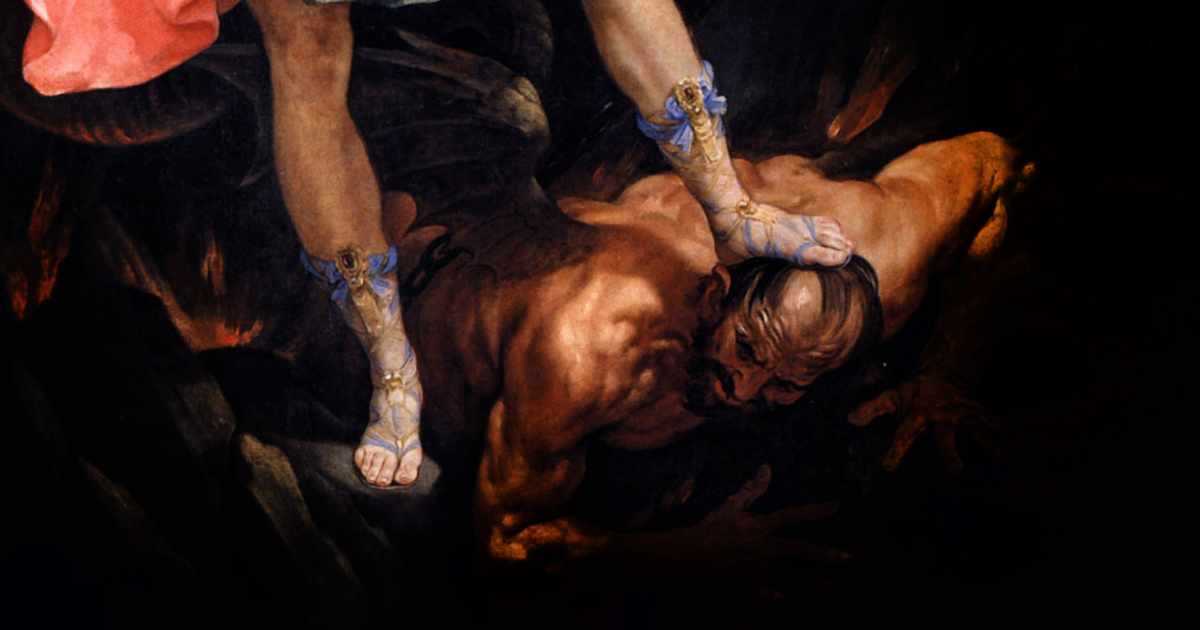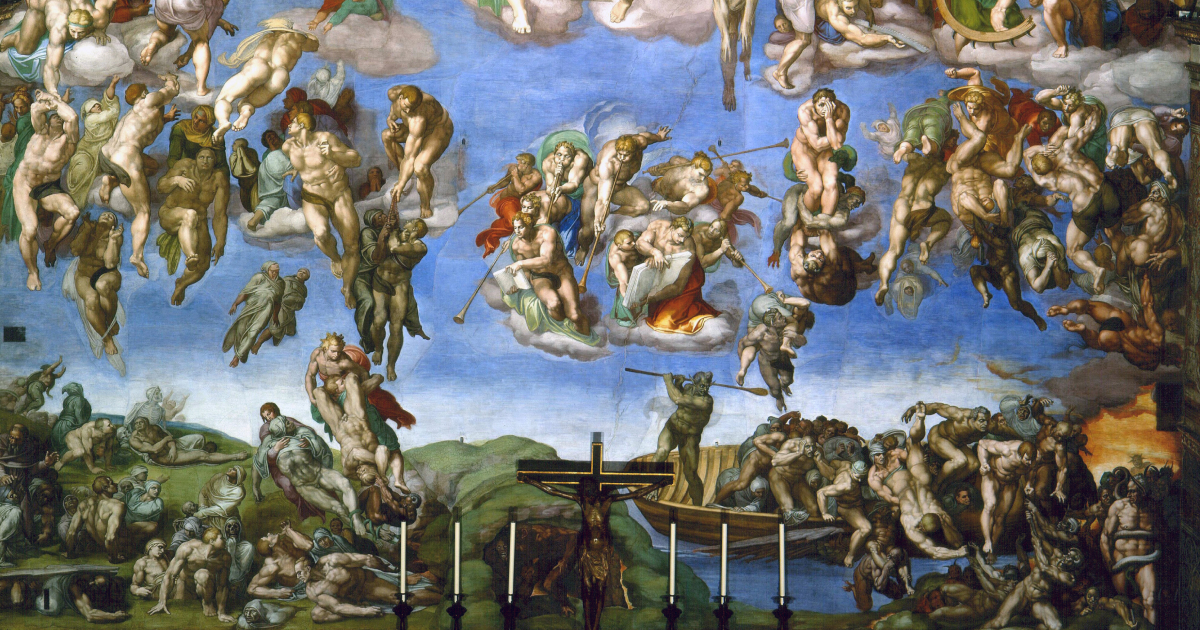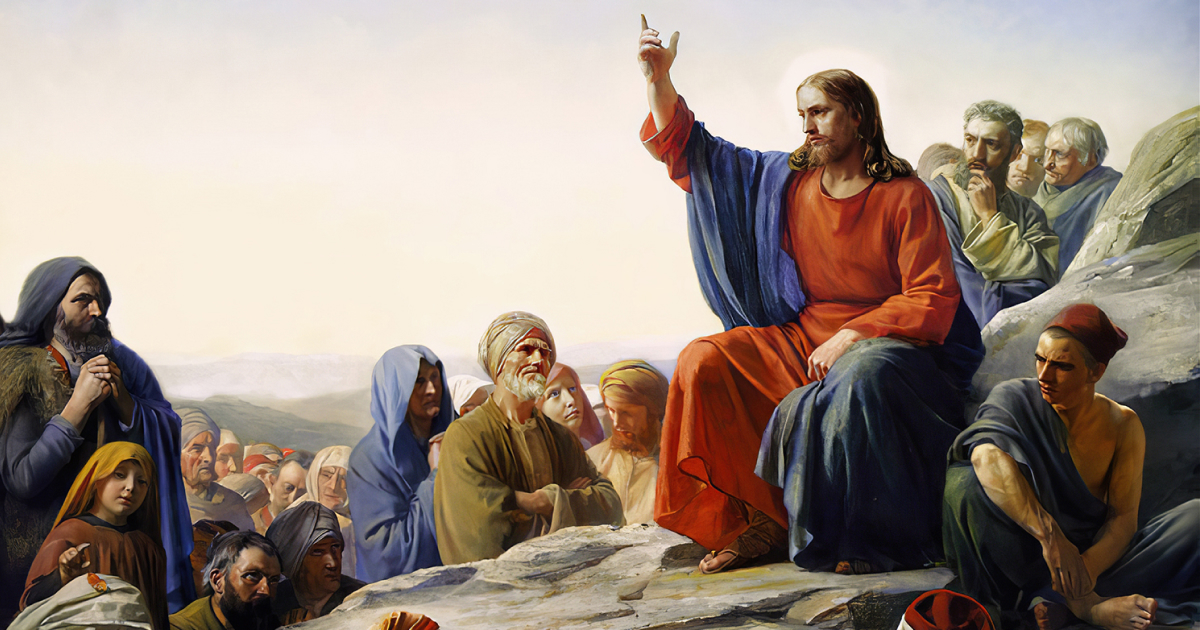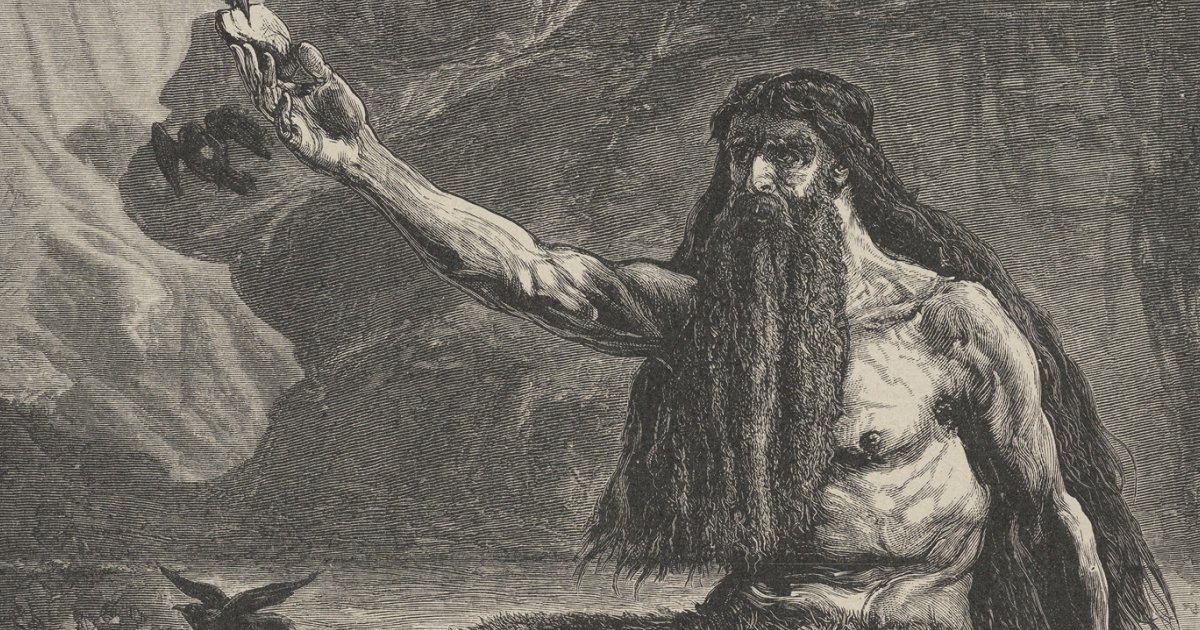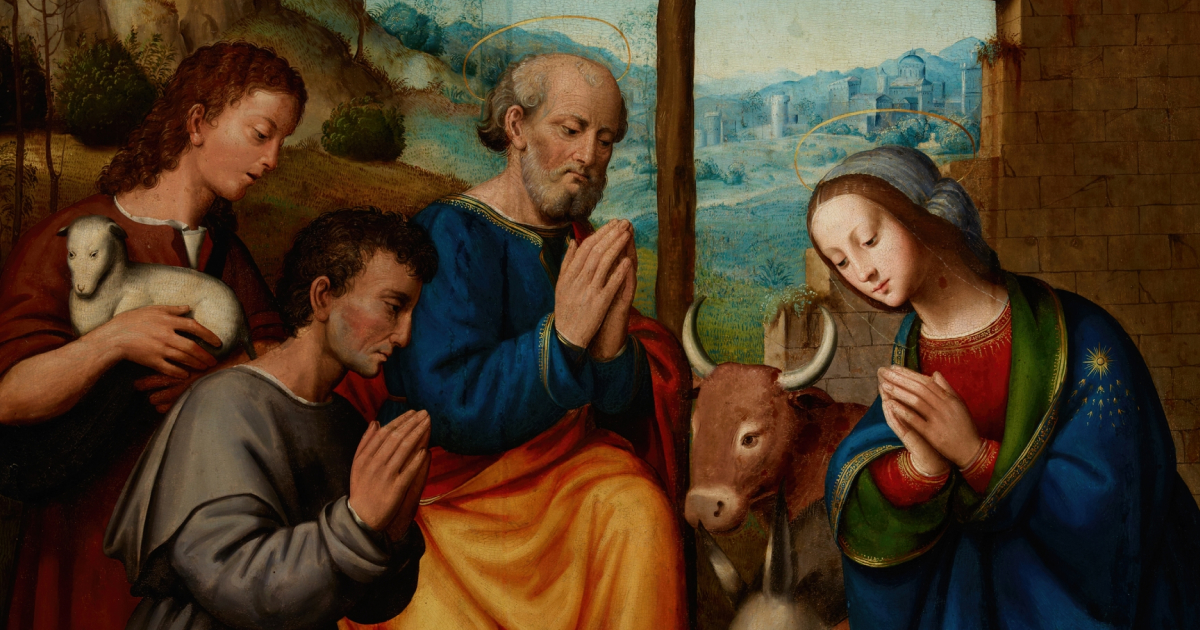When Bishop Robert Barron and Cardinal Müller sat down to talk for over an hour together a few days back, it was always going to be a matter of intellectual interest. There is a danger that when clever people start talking they are tempted to want to show off and dazzle their audience with their learning, but this was one of those very rare meetings where both men had the capacity to gear their intelligence to the need of the moment and allow it to come out as wisdom, offering an antidote to the existential crisis faced by Church and culture.
Their conversation produced some scintillating quotations which summed up the condition of the Church and society today and have given the rest of us a great deal to work with. One of the temptations faced with conversations of that depth is to make a précis of the whole span of it. The real challenge for commentators is to bring the most important moments and perceptions into focus and highlight them.
The conversation (it seemed to me) almost unexpectedly took off when Bishop Barron asked what appeared to be a casual question of not great immediate importance. I wondered if he entirely expected the extraordinary perspicacity with which Müller responded and which set the tone for everything that followed. He asked casually: “Why do you think American teenagers are interested in Nietzsche?”
Müller’s response was to give a laser-focused deconstruction, in the popular not the academic sense, of the way in which Nietzsche represented one of the main threats to the Christian faith. But he introduced Nietzsche with a brief analysis of delusion.
Delusion
We are all familiar with delusion. We all suffer from our own. Some of them may emerge from the pressure of unmastered appetite and others are brought on by the fog of spiritual warfare. In this case Müller synthesised the cultural delusions by choosing three particular fathers of delusion which set the scene for the damage Nietzsche was to do.
They were Copernicus, Freud and Darwin. I was taken aback when I heard him start with Copernicus because I wondered how on earth he was going to use the shift in astronomical perspective to offer us a lesson on spiritual delusion. But soon it became clear, and I had never heard the link made quite so potently and dramatically before.
Copernicus
Müller’s point was that moving us scientifically from Ptolemy to Copernicus had a powerful effect on our sense of spiritual and philosophical perception. The implications of moving from a Ptolemaic perspective, where we were at the centre of the universe and the focus of God’s attention, to the Copernican universe, where we were an outlying planet attached to an outlying star nowhere near the centre of the universe, had a powerful effect on the mind of humanity. It interpreted our geographical coordinates in the universe as an existential threat: instead of being the centre of God’s attention we moved to a place where we just did not matter. It was this state of feeling, that we just did not matter, which underlay the whole arc of Cardinal Müller’s exegesis that followed.
Freud
He followed this up with an attack on Freud and condensed Freud’s influence into the suggestion that, in part because of his emphasis on the power of the unconscious, we were not masters of our feelings but instead victims. So now we are victims who cosmologically do not matter.
Darwin
He then added Darwin and suggested that the consequence of Darwinian biology was that we really were just evolved animals, and this gave us a triple blow: animals subject to our feelings, and victims who lived in a place where God could not see us and was not interested in us. In this way the seeds of existential despair were sown.
Before discussing Nietzsche, he offered a brief synopsis of the gospel. One of the great surprises of this conversation was that Müller, a theologian of such stature, a philosopher of such depth and an ecclesiastical person of such distinction, capable of giving us the gospel summarised in a paragraph in a way that healed both mind and heart. That does not happen very often.
He said: “We must counter this Nietzscheanism with a discovery that it is a joy to exist, a great luck, a good luck. Nothing is better than your existence. You have eternal meaning. You come out of nothing by the goodwill of God. All education ought to be directed at the experience of discovering you are accepted absolutely, because you are accepted by God; you are a creature of God; and the same God is saving you by the blood of his Son who took your flesh.”
Having given us the good news that every human being belongs, he began to offer a deeper commentary on the state we were in, which began with the warning that original sin had wounded us but not destroyed us, and that the knowledge of God as Love, in the realisation of Christ, would carry us into that final healing we call salvation.
The Church has an answer to our despair
One of the leitmotifs in my own writing has been trying to explain that my becoming a Catholic was in part inspired by the discovery and conviction that only the Catholic Church has the capacity to offer a repudiation, and an antidote, to the decay and delusion of our culture.
Barron raised this whole exciting and, to my mind, under-developed dramatic perspective when he asked of Müller: “Do you agree the Church is the most important voice battling the nihilism in our culture?”
Müller’s reply was devastating: “The Church is a great counter-voice and therefore must not retreat into our privacy. We are so attacked because we are presenting the truth about Jesus Christ, and we are destroying their model for making money.”
For me this was one of those extraordinary penny-drop moments, or as the philosophers put it more pithily, a moment of disclosure, because Müller went on: “They are making money from their delusions, by saying: you are nothing, and you have to accept our medicine and our drugs. Modern ideologies are only drugs to help you overcome this feeling that you are nothing.”
This is a most powerful takedown of our culture. We are only slowly becoming aware that we live within a post-capitalistic machine that is subjecting all value to the pursuit of profit. Whether it is the apocalyptic delusions of climate disaster, pornography, the pharmaceutical industry, or the psycho-dominance of advertising, we have found ourselves to be cogs in a money-making machine predicated on fostering our delusions and creating money for others.
Müller then offered the antidote in a few simple illuminated words: “But if you are listening (to the Catholic Church), you do not need all these drugs; you do not need sex in the wrong sense; you are a partner of the Word of God. You are a son or a daughter of God. Those who listen to the voice of God need no substitutes: they possess a dignity that no ideology can give them.”
Delightedly, Barron picked up the baton and, accompanied by Augustine, ran with it by amplifying this as he said: “People make the mistake of taking the creature for the Creator, and they lose their way trying to fill themselves with stuff to satisfy their appetite for God.”
In a few words, Barron and Müller had exposed the vacuity of the deus ex machina strategy our culture has pursued in order to drive a wedge between us and the reality of God, and they identified the Catholic Church as what seems to be the last man standing capable of countering these delusions and replacing them with the truth about our God-given instincts, the love and forgiveness of God, and his invitation to make our journey and pilgrimage closer to him step by step.
Nietzsche: prophet, victim and master of suspicion
Müller described Nietzsche as the “Master of suspicion”. They went on to discuss some of the implications of Nietzsche’s influence. For those who do not know what Nietzsche wrote, or have trouble remembering, or have never read him, Barron and Müller offered a brief but powerful synthesis.
They reminded us that everyone knows the phrase “God is dead”, but they do not really understand how disaster follows from Nietzsche’s original premise. Nietzsche was both a prophet and a victim. He perceived the nihilism and wanted to escape from it with his “eternal return” theory, the theory that every moment of our lives records again and again for all eternity. But as Müller said, he failed and simply produced more nihilism.
However, “Nietzsche did not celebrate the death of God, he announced it as a catastrophe for Western civilisation. When the Christian God dies, the whole architecture of objective truth and objective morality collapses. What fills the vacuum? The Will to Power. And we see this today: truth becomes whatever the stronger party can impose.”
Then came one of the most powerful lines in the whole conversation, which becomes a critique of the corrosion of theology tempted by Nietzscheanism within the Church: “Many people today, even inside the Church, live as functional Nietzscheans without knowing it. When doctrine or moral teaching is treated as an obstacle to ‘pastoral accompaniment’ or to ‘inclusion’, and we are told we must simply override it because ‘the Spirit is doing a new thing’, that is the Will to Power dressed in theological language.”
Barron picked this up immediately and responded: “So the danger is not just secular culture, but the spirit creeping into ecclesiastical life?”
Müller, deepening the precision of his analysis, went on: “Precisely. Nietzsche prophesied the arrival of the letzter Mensch, the Last Man, who blinks and says: ‘We have invented happiness’, a soft, comfortable, mediocre humanity with no transcendence. He feared even more the Übermensch, who would create values ex nihilo by sheer force of will. Both dangers are present now: the soft Nietzscheanism of consumerism and the harder Nietzscheanism of ideological imposition.”
Nobody mentioned Pope Francis and the synodal process as it has been presented to the Church, but as we know, accompaniment has become the code word by which we identify this new spirit. Without putting it in so many words, Müller was identifying the overriding theological preoccupations of the last twelve years as being a form of papally driven theological Nietzscheanism.
Three symptoms of the Nietzschean spirit
In case we had not grasped the implications of this new spirit, three areas of life were identified as having been influenced by it.
- A rejection of an objective moral order
Müller commented: “Nietzsche said Christianity is a slave morality because it protects the weak. Today when the Church’s sexual ethics or defence of unborn life is dismissed as rigidity, or as not ‘accompanying’ people, we are hearing that Nietzschean accusation afresh again.”
- Truth reduced to power
Barron quoted Nietzsche’s fragment from The Will to Power: “There are no truths, only interpretations.” He then asked: “Isn’t this the air we breathe in gender ideology and in so much language that speaks of ‘paradigm shifts’ rather than fidelity to revealed doctrine?”
Müller nodded and added: “Yes. When a bishops’ conference or theologian says ‘the Church must change a teaching because culture has changed’, that is Nietzsche’s hammer smashing the old tablets to make room for the new ones.”
- The death of metaphysics and the rise of pure subjectivity
Barron observed: “Nietzsche saw that once God is removed as guarantor of being, man becomes the measure of all things, not in the gentle Protagorean sense, but in the violent, self-creating sense. This is why some modern theology speaks of resurrection as a symbol, or God as a horizon of meaning, rather than the living God who raises Jesus bodily from the dead.”
Müller drew this attack on secular culture and its progressive ecclesiastical echo to a close by saying: “We do not need to fear Nietzsche the diagnostician, he saw clearly what happens when Christ is pushed out of the culture. What we must fear is Nietzsche the false prophet who offers the Will to Power as a solution. The only real answer is the one Ratzinger gave at Regensburg and Subiaco: calling us back to the Logos who became flesh, the God who is Love and Reason together. Without that, everything collapses into power games, even (and sometimes especially) inside the Church.”
Müller, Barron, and the Battle for Vatican II
Both Barron and Müller set out to rehabilitate the Second Vatican Council in the face of two polarised extremes. On the one hand are the proponents of the so-called “spirit of Vatican II”, progressives who wanted to hijack the Council and drive it far beyond what the Fathers intended. On the other are the radical traditionalists, or “rad-trads”, who insist that Vatican II was aberrational or even harmful to the Catholic magisterium.
Barron expressed it like this: “You have the progressives who, well, kind of go beyond the text of Vatican II, let us reinvent the Church. And then you have the radical traditionalists in our country who are also uneasy with Vatican II.”
Barron then referred to the unifying influence of the late Cardinal Francis George. He appealed to Cardinal George’s insistence that the Council’s texts were both authentic and profound, and observed, with pointed understatement, that many among both progressives and rad-trads “have not succeeded in reading the text of Vatican II adequately”.
Müller took this further. He explained that these two poles of critique represent “a splitting of the mentality of Occidental society, but this is the ideological splitting; the question in the Church is the truth revealed in Jesus Christ”. In other words, Müller sees the ecclesial polarisation as mirroring the wider cultural schizophrenia of the West, a fracture that can only be healed by returning to the authenticity and integrity of the Council’s actual documents.
Müller was emphatic that no rupture exists with earlier councils: “The Council’s doctrine is nothing other than the doctrine of the Church from the beginning. There is no rupture, but rather continuity.”
I found his reading of the Church’s polarised critiques as symptoms of a deeper cultural split perceptive and genuinely clever. It gives the contemporary fractures a kind of paradigmatic continuity with the wounds of the broader historical psyche. But I was not entirely convinced by his defence of the Council. Although everything he said was true, Vatican II does, after all, explicitly refer to Nicaea, Chalcedon, Trent and Lateran IV, and situates itself in that theological continuity articulated through modern language, he did not actually engage the traditionalist criticisms. His defence of the liturgical reform was, frankly, one of the few limp moments in what was otherwise a brilliant tour de force. In truth, listeners’ evaluations of that section were always going to be governed by their pre-existing stance on Vatican II.
He did, however, offer something important in interpreting the present papacy. It certainly sounded as though we were being given a glimpse into Pope Leo’s own mind when Müller said that Leo is acutely aware of the “schism in the mind of the Church”, the pull between a mistaken medievalism and false progressivism, and wants to move slowly and cautiously in order to heal what would otherwise harden into ideological party spirit.
Liberation Theology
The closing reflections on liberation theology carried particular weight, given that Pope Leo spent so many formative years as a bishop in Peru. Müller’s analysis may well echo aspects of Leo’s own thinking.
In favour of the movement, Müller offered the suggestion that liberation theology might be understood as “a capture of Marxism by Christianity rather than a capture of Christianity by Marxism”. On this reading, it borrows Marx’s concern for oppression and pours it into Christian categories, though he cautioned that this always risks a clash of interpretative frameworks. Which one ultimately dominates?
In the end, Müller reverted to the more conventional critique: that a Marxist framework, even when baptised in theological language, tends to reduce salvation to structural change and, in doing so, quietly removes the need for God. Liberation, he warned, ends by swapping surrender for struggle, turning Jesus into a kind of socialist prophet rather than the suffering servant who saves souls.
Our moment of Catholic history
What emerged from this dialogue was not simply a commentary on Vatican II, nor even a critique of the polarities that shape the modern Church. It was something more like a map of the Catholic mind at this moment in history. Both Barron and Müller, each in his own voice, were trying to rescue the Church from the false choices imposed by our age, by this post-Christian culture, the illusion that we must be either nostalgic reactionaries or ideological progressives. Their shared insistence was that the Church’s life does not succomb to the contours of non-ecclesial ideology but rests on the continuity of revelation and the living tradition.
Müller’s diagnosis of the cultural schizophrenia of the West, mirrored in the divisions within the Church, felt particularly compelling. It offered not only an analysis but a kind of pastoral realism. If the Church appears divided, it is because the world to which she ministers is fractured at its root. The task, then, is not to take sides as they are proffered, but to heal the wound.
Perhaps that is where Pope Leo’s intended strategy and significance may reveal itself. If Müller is right, Leo recognises that the true danger is not this or that faction, but the hardening of ideological identities within the Body of Christ. His instinct is to move cautiously and carefully, without theatrics, and to avoid the polarities. This may frustrate some, but it may also be the only way to restore unity without sacrificing truth.
The conversation ended, as so many authentic theological conversations do, with the Cross. The temptation of every age is to turn Christ into a symbol of our politics, our movements, our ambitions. Liberation theology errs when it makes him primarily a social revolutionary, just as neo-medievalism errs when it reduces him to a mascot for reaction. The real Christ stands above both: the suffering servant, the Lamb who was slain, the Word who judges all ideologies and redeems all realities.
To follow him is not to take up a side so much as to renew our willingness to take up the Cross. The renewal of the Church may depend on our willingness both to see beyond and to slip the grip of the fractures of our age, and to recover a commonality of mind that reflects more the mind of Christ than the agendas and coordinates of philosophy and history.
After an informed excursus into European philosophy, Müller returned to the sources. In a moment of sincerity, fidelity and clarity he reiterated: “No philosopher or politician can save me at the hour of my death. Only Jesus Christ, the Son of God made man, can do so. He is the only Saviour of the world.”
(Photo credit: Bishop Robert Barron Facebook page)








